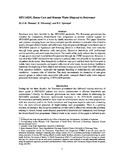HIV/AIDS, home care and human waste disposal in Botswana

View/
Date
2005Author
Phorano, O.M.
Nthomang, K.
Ngwenya, B.N.
Publisher
Botswana SocietyType
Published ArticleMetadata
Show full item recordAbstract
Batswana have been hard-hit by the HIV/AIDS pandemic. The Botswana government has
initiated the Community Home-Based Care programme to provide material support for
HIV/AIDS patients cared for at home by family members and relatives. This paper identifies
and explores emerging home care issues and pays specific attention to potential risks related to poorly managed clinical human and solid waste disposal generated through home-based care of
HIV/AIDS patients in Ngamiland and Kweneng Districts in Botswana. Data were collected
through focus group discussion with care-givers, discursive interviews with professional
service providers, and participant observation. The results of the study indicate that the majority of care givers received material benefits provided through the CHBC programme. However, it was clear that CHBC did not have the capacity to address other critical needs for the proper care
of patients in the home. Most households studied are very poor and lack basic facilities such as
toilets, basic waste receptacles and regular collection of solid waste. Access to these facilities is
important for disposing of both clinical and ordinary human and solid waste from HBC patients. Poor sanitation facilities - especially the improper handling of soiled laundry and inadequate
ventilation - increase risks of infection. The study recommends the formation of care-giver support groups to reduce risks associated with poorly managed clinical solid waste disposal
generated from home care-giving of HIV/AIDS patients.
Collections
- Research articles (ORI) [270]
